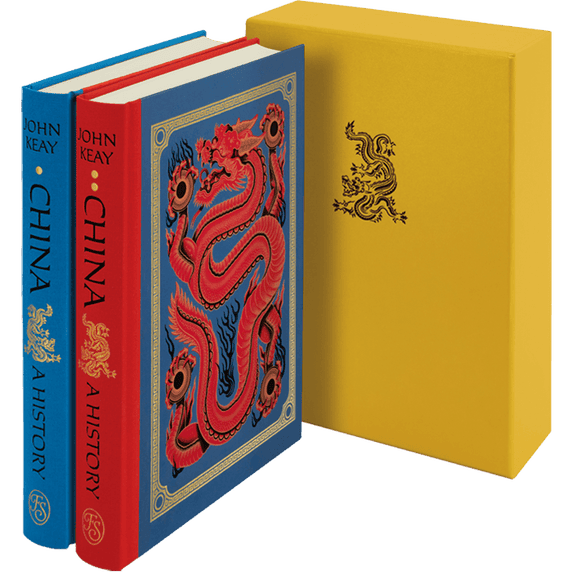
China
Covering 3,000 years, John Keay’s China: A History chronicles one of the world’s great civilisations, from Confucius to Mao, in an exclusively updated Folio Society edition with lavish colour illustrations and a new introduction by the author.
Illustrated by Mu Pan
Introduced by Frances Wood
Translated by Arthur Waley
One of the Four Great Chinese novels, and a worldwide cultural phenomenon, Monkey is reimagined as a Folio edition with exquisite artwork by Mu Pan, including a foldout map, and a new introduction by Frances Wood.
‘A delectable introduction to Chinese literature.’
- David Lattimore, New York Times
Wu Cheng’en’s 16th-century retelling of an ancient Chinese folk tale combines spiritual wisdom and legend with a large dose of humour, making it the ultimate adult fantasy adventure. Charting the perilous mission of a shape-shifting, cloud-jumping monkey through China and India to retrieve sacred Buddhist scrolls, the themes of freedom, identity and heroism have resonated through the ages and the Monkey King has inspired generations of authors, artists, filmmakers and anime creators.
The fantastical tale has been reimagined as a tall, slender Folio edition that is evocative of ancient Chinese scrolls, with exquisite illustrations by Chinese-American artist Mu Pan. Fusing classic and contemporary elements, Mu Pan celebrates the cultural heritage of this masterpiece, his incredible fold-out map completing the edition.
Bound in blocked cloth
Set in Garamond
344 pages
Frontispiece and 6 colour illustrations, including one double-page spread
Black & white illustrated title-page
Fold-out map
Blocked slipcase
11˝ x 6˝
Drawing influence from folk-art, and with a particular interest in Chinese scroll paintings and Japanese prints, Chinese-American artist Mu Pan was on the Folio radar to illustrate this edition. His talent for timeless visual storytelling spills from each of his seven incredibly detailed and beautifully executed colour drawings; the characters and their fantastical adventures coming to life under his careful hand. Our edition also includes a specially commissioned fold-out map, which leads the reader along Monkey’s adrenalin-filled adventures. Chinese history expert Frances Wood has written a new introduction which is both a celebration of the novel and a fascinating precis of ancient Chinese literature and Monkey’s role in it.
‘Monkey was brought to the place of execution, where heavenly soldiers bound him to a pillar and began to hew him with axes, stab him with spears, slash him with swords. But all this had no effect whatever.’
An abridgment of the longer Chinese epic, Journey to the West – one of the Four Great Chinese Novels – Monkey is also widely known as a standalone book with exceptional literary kudos. The renowned Arthur Waley translation won the James Tait Memorial Prize in 1942. Folio first published Monkey in 1968 and this edition returns to Waley’s rich and timeless interpretation. Bringing together the wisdom, culture, myth and legend of ancient China, and reimagining it for a 16th audience, Wu Ch’eng-en’s extraordinary adventure sees Monkey and his cohorts overcome evil wizards, ogres, demons and dangers, as they forge a path to India with Tripitaka to find the artefacts that will deliver enlightenment.

